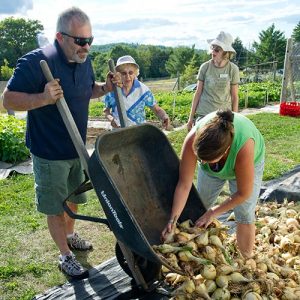Oh My Aching…
 With the increased awareness of local foods and health benefits, home gardening has been become a popular activity. In turn, the number of gardening-related injuries has increased. These injuries can be attributed to increased strenuous activities over the weekend — the endearing term “weekend warrior” comes to mind.
With the increased awareness of local foods and health benefits, home gardening has been become a popular activity. In turn, the number of gardening-related injuries has increased. These injuries can be attributed to increased strenuous activities over the weekend — the endearing term “weekend warrior” comes to mind.
Improper work practices while gardening may make it difficult for you to enjoy your favorite past time. Before you head out to the garden consider your most important tool — YOU! Stretching warms up your joints and muscles to make your gardening activity more enjoyable (for specific stretching exercises, see Nebraska AgrAbility’s Farmer Daily Stretching Program (PDF)).
You can also help prevent injury or undue stress while working in the garden by listening to your body. Respect pain, it’s a warning signal that something isn’t right. Be mindful of your posture while working; poor posture can lead to fatigue and strains. Avoid staying in one position too long by switching tasks routinely — bend, stretch and move around to avoid stiffness. Likewise, repetitive motion activities can lead to injuries or strains. Mix it up while working — weed, hoe, enjoy! Being safe also includes being aware of pinch points and cutting edges — wearing the appropriate protective gear while working, including sun protection. Beware of carrying loads that are too heavy, use assistive tools such as wheel barrows, and proper lifting techniques.
Ergonomically designed tools are becoming more popular and are widely available. These tools are designed to keep the body in neutral positions to minimize stress on joints while maximizing power with less energy. Ergonomic tools are generally made with large, soft handles to allow you to get a better grip on the tool while reducing vibration and slipping. The tool should also have a depression or ridge on the top of the tool for your thumb to rest against. This will assist in keeping your wrist in a neutral position as you work. Spring loaded or power assist tools will make your job easier and faster while longer handles on tools will allow you to reduce back strain and increase leverage which requires less strength.
Also consider the weight of the garden tool, most are designed for men, but some are designed especially for women. Lightweight or telescoping tools can extend your reach and reduce strain on your back or awkward reaching positions. Tools can be adapted at home with the addition of PVC piping to lengthen the tool, and additional handle or “D-grip” for a two-handed grip or adding foam insulation to pad the tool. Adapting your tools or garden space to allow you to work upright will reduce back strain and muscle fatigue.
If you are one of the many affected by arthritis, gardening can be an excellent therapy to help maintain flexibility, increased range of motion and increase your quality of life. The Arthritis Foundation has excellent resources available. Employing safe gardening work practices with a focus on basic ergonomics may help you continue to enjoy gardening the whole season long.
Maine AgrAbility is a non-profit collaboration of the University of Maine Cooperative Extension, Goodwill Industries of Northern New England, and Alpha One. Maine AgrAbility is part of a nationwide network of United States Department of Agriculture (USDA) programs begun through the 1990 Farm Bill. The goal of the National AgrAbility Project is to inform, educate, and assist farmers, ranchers, farm workers, and their families with disabilities, so they can continue to have successful careers in agriculture.
